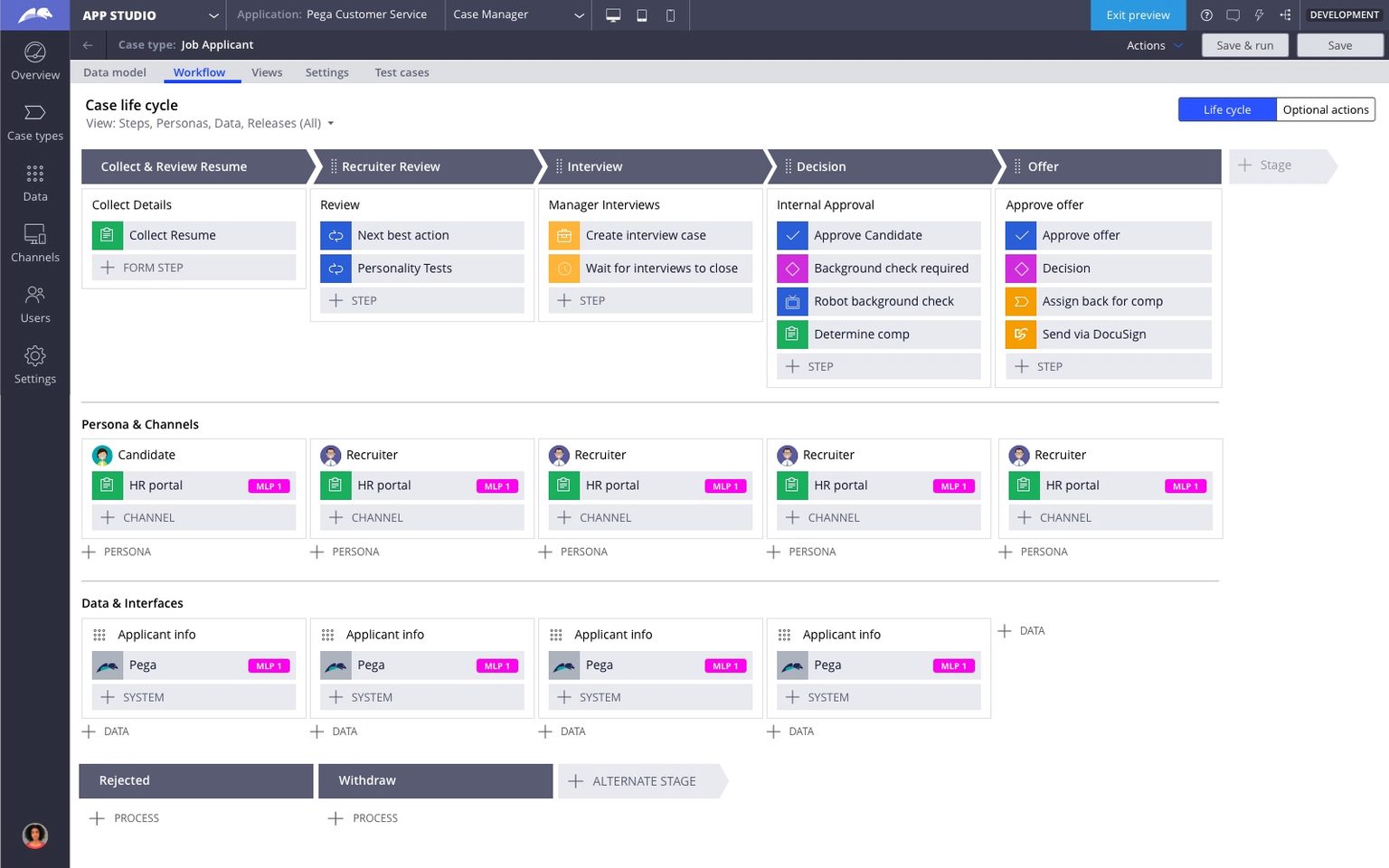The low-code market is full of big, bold predictions...
...and it can be tough to cut through the hype (sometimes even for those of us who might help generate it). Don’t get me wrong, I am as excited as anyone about the promised future low code enables in the democratization of development. But IT professionals are facing long, growing backlogs and heightened expectations around cloud, DevOps, privacy, and security. IT managers and their teams are looking for tools which can help them effectively manage their workloads and deliver value faster today.
Low-code platforms are a viable solution because they provide tremendous value for professional IT teams:
- Alignment: Increased collaboration with business stakeholders
- Speed: Rapid development and ability to adapt to change
- Capability: Access to new technologies with little-to-no training
- Governance: Effectively scaling business-led automation
However, despite these benefits, professional developers often have a skeptical view of low-code platforms. Our very own Sam Tremlett (Pega Senior Product Manager for Low Code) was one of those skeptical professional developers when he first joined Pega’s IT team back in 2013. Since then, he’s come around. So, I sat down with Sam to understand his journey with low code.
Seeing the light: going from low-code skeptic to evangelist
Matt:
“Sam, you love low code more than anyone I know. Have you always been such a huge fan?”
Sam:
“Not at all. I’ve been developing for over 15 years now. It began with ‘Hello, world!’ Python projects in an afterschool program in high school and continued through college where I studied both electrical engineering and computer science.
Like many professional developers, I kind of scoffed at ‘low-code’ platforms, thinking that they were mainly for people who didn’t know how to code and would be too rigid or too flimsy for what I wanted to get done. But I started to come around just a little in college where my thesis project was to build an operating system from the ground up – from soldering resistors, to wiring switches, up to developing a programming language which interacted with the board … that’s when I really began to appreciate model-driven tools which allowed me to focus on solving business problems.”
Low code for professional developers benefit #1: better collaboration with business stakeholders
Matt:
“Got it – and after college is when you joined the IT team at Pega. What were your initial impressions?”
Sam:
“Well here at Pega, we have a saying: ‘drink your own champagne.’ We believe that the best way we can prove our product delivers value is to try it out ourselves, so just about every IT application we use at Pega runs on the Pega platform.
And my first project on the IT team was to develop a new contracts management system. I, being new to the industry, obviously knew nothing about the contract process – the workflows, the people involved, the data required, etc. I needed to work side-by-side with the business officer team who owned the process. If I had been coding the system from scratch, this would have been impossible. You can’t just pull up blocks of code in your IDE [integrated development environment] and expect a business stakeholder to understand how you’re architecting a system. We’d need to write and maintain lengthy requirements documents which translates between what they need and how the code worked.
But with low code, I was building the application using visual constructs which made sense to business stakeholders – which enabled more effective communication, faster feedback, and complete alignment. We worked side by side laying out the process, stages, and steps, and then the user interface (UI) for the users. With the right process and UI, I was able to connect it to the backend application programming interfaces (APIs) and deliver a great app. Instead of spending time translating between documents and code, we could speak the same language with the business stakeholders – an outcome-centric language.

Example low-code workflow
Collaborating on the application business outcomes also set me up for much more effective reuse. We could talk through which workflows, rules, and views would be shared between various stages of the contract process – and even beyond. If I had been writing code, collaborating on an effective architecture would have been tough and the way I would have set up the projects, classes, and methods might not have aligned with the broader business picture.”
Low code for professional developers benefit #2: rapid development and adapting to change
Matt:
“Bringing business and IT together like that is critical to successful application development. It makes sense that having shared visual constructs throughout the development process enables that collaboration.
Beyond this, what was your experience with the actual development aspects of low code when compared to what you were used to?”
Sam:
“Low-code development definitely improves my productivity. Changes to existing applications in a built-from-scratch project usually mean refactoring, or at very least, digging through modules to refamiliarize myself with the code. With a low-code platform, most requests from users or business stakeholders come down to changes on a form or quickly adding a block to a flow.
And for starting new projects, low-code platforms enable me to develop a working MVP [minimum viable product] application so much faster. With a coded project, you often need to spend time configuring cloud infrastructure, evaluating and setting up libraries, building out the architecture which underpins, workflows, and decisions while planning for future reuse, and more. Low-code platforms handle all of that for me, allowing me to focus on solving business problems.”
Low code for professional developers benefit #3: access to new capabilities
Matt:
“Between open-source tools and cloud vendors, there are so many choices to make when starting a new project. Low code can not only simplify getting started but can actually help reduce ongoing tech debt because the core technology underlying the models can evolve and stay up-to-date. What else stood out about low code to you as a developer?"
Sam:
“My favorite thing besides the collaboration and speed it enables is the breadth of capabilities which low code can give you access to.
Prior to joining the Pega IT team, I only had a little exposure to emerging tech like machine learning, intelligent virtual assistants, and natural language processing. But even so, in my first few weeks, I was able to configure and deploy a chat bot in just a few hours of low-code configuration. Had I wanted to build and deploy a chat bot from scratch, it would mean a lot more training, extensive documentation, and help from subject matter experts.
So, the democratization impact of low code isn’t just for business users, it holds true for professional developers who want to get going fast with new technology too.”
Low code for professional developers benefit #4: effectively scale application development for business and IT alike
Matt:
“Totally, low code eliminates a lot of the roadblocks to innovation and automation. Even I was able to deploy a self-optimizing AI model for my workflow app (and nobody would ever mistake me for a professional developer). That was for an application which I led the creation of as part of our citizen developer program.
Can you talk about how the IT team has been able to help people like me get started with our own automation projects?”
Sam:
“Yes! One of the projects I took on when I was on the IT delivery team was bootstrapping Pega’s citizen developer program. The goal was to empower business-focused contributors like yourself from every function in the business to develop workflow automation applications and transform the processes which their team owned.
I was working closely with the first few citizen developers to:
- Flesh out their application idea
- Identify opportunities for reuse from existing applications
- Set up DevOps pipelines which included our IT standard gates for quality and compliance
- Provide continual coaching and enablement
The program quickly gained popularity, and like most developers I thought to myself, ‘How can I automate my work?’ This is how App Factory was born.
Effectively scaling citizen development required a platform which would help our IT team automate the enablement, coaching, reuse, and governance business developers needed to be successful. With this in place, our IT team is not only an effective delivery function, but a streamlined enablement function as well – all on one platform.
We now have hundreds of citizen developers and business-led projects which have transformed our internal processes. And this scaled approach has helped to minimize shadow IT. App Factory gives our IT team confidence that what has been built adheres to enterprise-level security, quality, and standards.”
Even though you’re not coding, you’re still problem solving
I ended by asking Sam what his final words were for professional developers still skeptical of low-code tools. He told me:
“I was that developer in college and early on when I joined IT. But low code helps everyone be more productive; and low-code platforms are pervasive now – across not only workflow automation and AI-powered decisioning, but integrations (iPaaS), business intelligence, data management, and more. We're never going to not need developers, but low-code platforms are just a tool to help them be more effective.
Give it a try - you'll be surprised.”
IT’s secret weapon to win the future
This report covers the new skillsets – and mindsets – needed to get with the program.
Learn morePut intelligent automation to work
To make your business truly resilient, you’ll need to respond fast and handle new volume efficiently.
Learn more
